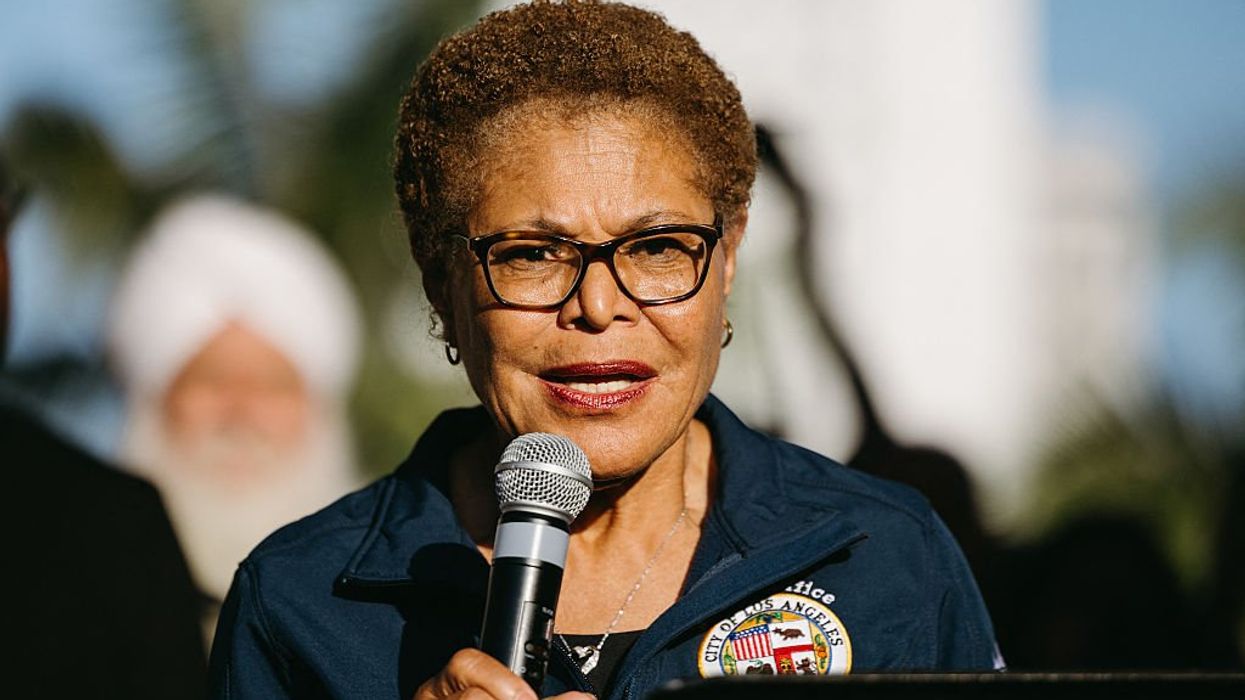
© 2025 Blaze Media LLC. All rights reserved.
...mandated under the Voting Rights Act.
 WASHINGTON (The Blaze/AP) -- In the run-up to the 2012 elections, the federal government is ordering that 248 counties and other political jurisdictions provide bilingual ballots to Hispanics and other minorities who speak little or no English.
WASHINGTON (The Blaze/AP) -- In the run-up to the 2012 elections, the federal government is ordering that 248 counties and other political jurisdictions provide bilingual ballots to Hispanics and other minorities who speak little or no English.
That number is down from a decade ago following the 2000 census, which covered 296 counties in 30 states. In all, more than 1 in 18 jurisdictions must now provide foreign-language assistance in pre-election publicity, voter registration, early voting and absentee applications as well as Election Day balloting.
The latest requirements, mandated under the Voting Rights Act, partly reflect second and third generations of racial and ethnic minorities who are now reporting higher levels of proficiency in English than their parents. Still, analysts cite a greater potential for resistance from localities that face tighter budgets, new laws requiring voter IDs at polls and increased anti-immigration sentiment.
Kerry Dougherty, a columnist for the Virginian-Pilot, addresses cost concerns, writing, "How much will this bilingual blowout cost? No one knows. Yet. No one in Washington seems to care. And why should they? This is just one more unfunded mandate from the feds." Clearly, this is a concern.
Effective this week, Hispanics who don't speak English proficiently will be entitled to Spanish-language election material in urban areas of political battleground states including Pennsylvania, Virginia, Wisconsin and Utah, as well as the entire states of California, Florida and Texas. For the first time, people from India will get election material in their native language, in voting precincts in Los Angeles, Chicago and New York, due to their fast population growth.
 More American Indian tribal languages will be made available in many parts of Alaska, Arizona and Mississippi, while Vietnamese and Taiwanese will get their own voting assistance in several new areas, including parts of Washington state, Texas, Massachusetts and California. Asian Bangladeshi must be provided for the first time in Hamtramck, Mich, which neighbors Detroit.
More American Indian tribal languages will be made available in many parts of Alaska, Arizona and Mississippi, while Vietnamese and Taiwanese will get their own voting assistance in several new areas, including parts of Washington state, Texas, Massachusetts and California. Asian Bangladeshi must be provided for the first time in Hamtramck, Mich, which neighbors Detroit.
"We would like to be in a society where everyone has equal opportunities to vote, but that's not the reality we're living in today," said James Thomas Tucker, a former Justice Department attorney who is now a voting rights lawyer in Las Vegas. Tucker said the law has been key in the election of new Hispanic and Asian officials in many places, even as he noted that a vocal English-only language movement and new budget constraints on local governments could stir fresh tensions.
"Some jurisdictions will see pushback," he said.
The Voting Rights Act provision, first approved by Congress in 1975, requires states, counties and political subdivisions to supply versions of ballots and election materials in other languages if a Latino, Asian-American, American Indian or Alaskan minority group makes up more than 5 percent of the voting-age population or at least 10,000 citizens.
The minorities must be unable to speak or understand English well enough to vote in elections, a proficiency level determined by those who indicate in census surveys that they don't speak English "very well." The minority group also should have literacy rates ranking below the national average.
In all, 248 counties and other political divisions must provide election materials involving 68 covered languages in 25 states, according to the list released Wednesday by the Census Bureau. The agency puts together the list based on its review of survey data on minority population growth, educational attainment and English proficiency.
It was the first decline in the total number since the bureau began compiling the list with English-proficiency criteria in the 1980s.

Under a separate provision of the Voting Rights Act, some 200 other jurisdictions are already required to provide bilingual material, including the entire states of Alaska, Arizona and Texas. With the newest additions this week, the total number of counties or subdivisions with requirements is more than 1 in 18.
The language requirements already have drawn fire from some Republicans, who complain they are too burdensome on local governments.
In a letter in August, Reps. Trent Franks, R-Ariz., who chairs a Judiciary subcommittee, and Trey Gowdy, R-S.C., who heads the House oversight panel on the census, asked the Census Bureau to delay release of the list to reexamine its criteria, given state and local budget crises they said will make it harder for localities to comply. They cited the case of Cuyahoga County in Ohio, which spent more than $100,000 on bilingual ballots in a light-turnout primary election last May.
Localities have struggled in the past with compliance, since they are left to figure out the best ways to provide bilingual materials at a reasonable cost. Shortly before the Voting Rights provisions were reauthorized in 2006, a Pew Center on the States study found that elected officials often would "ponder the impact of implementing - or in some cases sidestepping - the federal requirements."
It cited some confusion over how many bilingual ballots to print, or what types of election materials are covered. But Pew and separate government studies said compliance often could be achieved at lower cost by hiring bilingual poll workers who perform dual functions of translation and other Election Day tasks, as well as printing sample bilingual ballots that minorities could refer to.
The continuing demands for bilingual balloting come at a time when residents in the U.S. are increasingly likely to speak a language other than English at home, but who are also now more likely to have lived in the U.S. for at least a decade and be naturalized citizens who vote.
Eugene Lee, voting rights project director at the Asian Pacific American Legal Center, noted the significant impact that language assistance has had on voting and the election of Asian-Americans in places such as California. In Los Angeles County, officials will now be required to offer materials in Cambodian and Asian Indian languages in addition to Spanish, Chinese, Filipino, Japanese, Korean and Vietnamese.
Want to leave a tip?
We answer to you. Help keep our content free of advertisers and big tech censorship by leaving a tip today.
Want to join the conversation?
Already a subscriber?
Billy Hallowell is a digital TV host and interviewer for Faithwire and CBN News and the co-host of CBN’s "Quick Start Podcast."
Billy Hallowell
Billy Hallowell is a digital TV host and interviewer for Faithwire and CBN News and the co-host of CBN’s "Quick Start Podcast."
more stories
Sign up for the Blaze newsletter
By signing up, you agree to our Privacy Policy and Terms of Use, and agree to receive content that may sometimes include advertisements. You may opt out at any time.
Related Content
© 2025 Blaze Media LLC. All rights reserved.
Get the stories that matter most delivered directly to your inbox.
By signing up, you agree to our Privacy Policy and Terms of Use, and agree to receive content that may sometimes include advertisements. You may opt out at any time.





